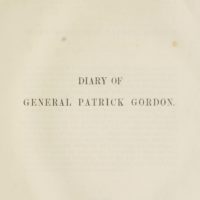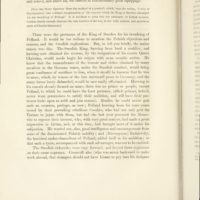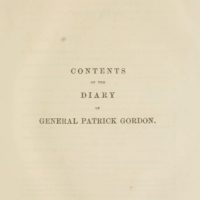
Related

DIARY OF GENERAL PATRICK GORDON

DIARY OF GENERAL PATRICK GORDON
![1661] DIARY OF PATRICK GORDON. 47 good earnest to consider how I might ridd myself of this countrey](https://cdn2.picryl.com/thumbnail/1699/12/31/1661-diary-of-patrick-gordon-47-good-earnest-to-consider-how-i-might-ridd-myself-8dac7f-200.jpeg)
1661] DIARY OF PATRICK GORDON. 47 good earnest to consider how I might ridd myself of this countrey

20 DIARY OF PATRICK GORDON. [1655 men with a gallant traine of artillery. It was a most delighttull

Portrait of General Patrick Gordon of Auchleuchries
![1666] DIARY OF PATRICK GORDON. 79 I did writt to Sir John Hebden](https://cdn2.picryl.com/thumbnail/1699/12/31/1666-diary-of-patrick-gordon-79-i-did-writt-to-sir-john-hebden-64f584-200.jpeg)
1666] DIARY OF PATRICK GORDON. 79 I did writt to Sir John Hebden
![1666] DIARY OF PATRICK GORDON. 63 noise, the Russes being unwilling to disoblige tbe Hollanders](https://cdn2.picryl.com/thumbnail/1699/12/31/1666-diary-of-patrick-gordon-63-noise-the-russes-being-unwilling-to-disoblige-aae600-200.jpeg)
1666] DIARY OF PATRICK GORDON. 63 noise, the Russes being unwilling to disoblige tbe Hollanders

CONTENTS OF THE DIARY GENERAL PATRICK GORDON.
![1667] DIARY OF PATRICK GORDON. 97 storme, wee could not gett over to Embden](https://cdn2.picryl.com/thumbnail/1699/12/31/1667-diary-of-patrick-gordon-97-storme-wee-could-not-gett-over-to-embden-4fd79e-200.jpeg)
1667] DIARY OF PATRICK GORDON. 97 storme, wee could not gett over to Embden
DIARY OF GENERAL PATRICK GORDON I AM not ignorant that it is thought as hard a taske for any man
Summary
Passages from the diary of General Patrick Gordon of Auchleuchries : A.D. 1635-A.D. 1699"
DIARY OF GENERAL PATRICK GORDON
I AM not ignorant that it is thought as hard a taske for any man to writt
the story of his own iyfe, and narrative of his actions, as for ane artist trulv
to draw his owne picture ; yet, haveing proposed to my self to writt onlv
by way of a journall, without makeing any reflections by blameing or com-
mending any of the passages of my Iyfe (following herein the counsell of
Cato, Nee te laudaveris^ nee te culpaveris ipsej^ I think it not uneasy •
especially not intending it for publick view, as also leaving to others, if
any shall take paines to read it, the free censure of any thing here done.
I have mentioned no more of publick effaires as came to my knowledge
relateing rumours for such and thruths for verity. Some publick effaires
(military I meane, for with those of state I have medled very litle, being-
out of my spheare) I have touched in a continued series, and others inter-
laced with the story of my owne Iyfe (defective, I confess, and that for
want of documents and intelligence) being such things the most whereof I
have been present at and seen myself. To conclude, 1 cannot tell you a
better or truer reason for writing this, as that it Is to please my owne
fancy, not being curious of pleasing any bodyes else, seing omnibus placere
hath been reckoned as yet among the impossihilia.
A.D. 1635.
In the year of our redemption one thousand six Imndred thirty and
fy ve, on the last day of March, about three aclock afternoone, being Easter,
Gordon was brought up and remained a lifelong Roman Catholic, at a time when the Church was being persecuted in Scotland. At age of fifteen, he entered the Jesuit college at Braunsberg, East Prussia, then part of Poland. In 1661, after many years experiences as a soldier of fortune, he joined the Russian army under Tsar Aleksei I, and in 1665 was sent on a special mission to England. After his return, he distinguished himself in several wars against the Turks and Tatars in southern Russia. In recognition of his service he was promoted to major-general in 1678, was appointed to the high command at Kiev in 1679, and in 1683 was made lieutenant-general. In 1687 and 1689 he took part in expeditions against the Tatars in the Crimea, being made a full general. Later in 1689, a revolution broke out in Moscow, and with the troops under his command, Gordon virtually decided events in favor of Peter the Great against the Regent, Tsarevna Sophia Alekseyevna. Consequently, he was for the remainder of his life in high favor with the Tsar, who confided to him the command of his capital during his absence from Russia. In 1696, Gordon's design of a "moveable rampart" played a key role in helping the Russians take Azov. One of Gordon's convinced the Tsars to establish the first Roman Catholic church and school in Muscovy, of which he remained the main benefactor and headed the Catholic community in Russia until his death. For his services his second son James, brigadier of the Russian army, was created Count of the Holy Roman Empire in 1701. At the end of his life the Tsar, who had visited Gordon frequently during his illness, was with him when he died, and with his own hands closed his eyes. General Gordon left behind him a uniquely detailed diary of his life and times, written in English. This is preserved in manuscript in the Russian State Military Archive in Moscow. Passages from the Diary of General Patrick Gordon of Auchleuchries (1635–1699) was printed, under the editorship of Joseph Robertson, for the Spalding Club, at Aberdeen, Scotland, 1859.
